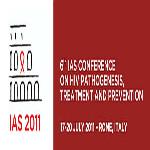July 18, 2011

Photo: IAS
Over the last 30 years life expectancy rates in Africa plummeted, as HIV/AIDS claimed millions of lives. But a new study says antiretroviral drug treatment can dramatically reverse that trend.
Professor Jean Nachega co-authored the study of some 20,000 patients in Uganda. He said, "The overall key finding of our study is that the patient in Africa receiving antiretroviral therapy for HIV can expect to live a near normal lifespan."
The findings were released at the International AIDS Society Conference on HIV Pathogenesis, Treatment and Prevention in Rome – and published in the Annals of Internal Medicine.
Lost years
Before the HIV/AIDS epidemic, expected lifespans in many African countries had risen sharply. Nachega, who is a professor of medicine at South Africa's Stellenbosch University and a scientist at the Johns Hopkins Bloomberg School of Public Health, witnessed the change caused by the disease, cutting 15, 20 or more years from life expectancy.
"All what we've been able to gain in the past with the access to clean water, expanded immunization programs were totally reversed with the HIV/AIDS epidemic in Africa. So now we are seeing some good news that investing in antiretroviral programs, those investments are now paying off," he said.
He credits PEPFAR, the President's Emergency Plan for AIDS Relief, and the Global Fund to Fight AIDS, Tuberculosis and Malaria.
Gender differences
However, while the overall findings are positive, they do show a difference between men and women. Women are living longer. One reason is that men wait longer before receiving treatment.
"Men just in general have a less health-seeking behavior as compared to females. Men spend more time looking for a job and spending more time away from their family to try to find a way to survive, I think may be one of the reasons. The second reason is obviously the issue about stigma, which is still quite affecting the majority of the people in the community," he said.
Women may have a greater opportunity to learn their HIV status and receive treatment through pre-natal care programs. He says health officials need to "think hard" about how to overcome the "gender imbalance" in treatment.
Nachega supports the strategy of using treatment as prevention.
"We should no longer see treatment and prevention totally separately. Treatment, by itself, is also part of prevention. Because by treating people, and hopefully treating people earlier, they are less likely to transmit the virus to their sexual partner," he said.
Studies also show that giving uninfected people antiretrovirals can help protect them from HIV during sex with their infected partners. It's called preexposure prophylaxis (PrEP).
Nachega says with the prevention tools now available, great progress can be made against the epidemic. But he says the magic bullet of an effective AIDS vaccine remains elusive.